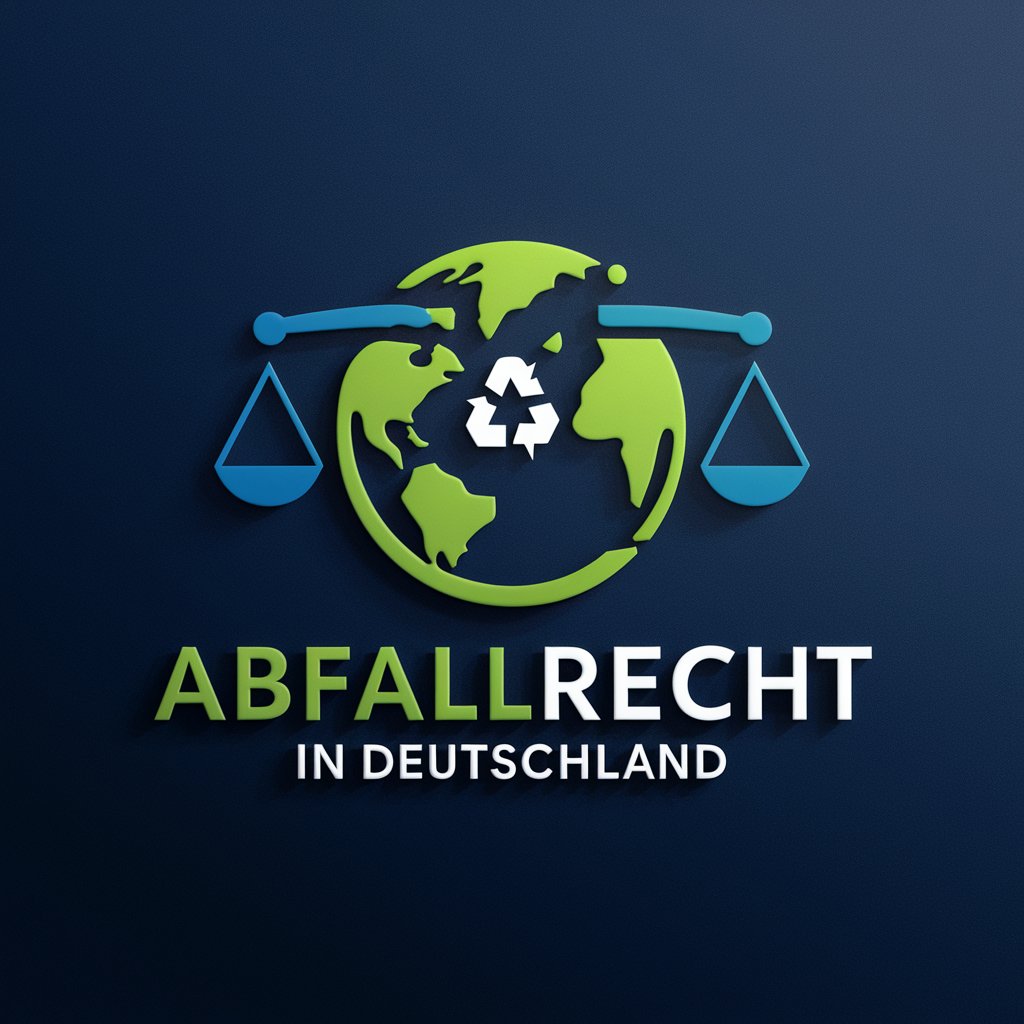
Abfallrecht in Deutschland - German Waste Law Guide

Welcome! How can I assist you with German waste law today?
Navigate waste laws with AI
Explain the key principles of the Kreislaufwirtschaftsgesetz (KrWG).
What are the requirements for the disposal of hazardous waste in Germany?
How does the Verpackungsgesetz (VerpackG) affect businesses?
Describe the obligations of waste producers under the Abfallrahmenrichtlinie (AbfRRL).
Get Embed Code
Introduction to Abfallrecht in Deutschland
Abfallrecht in Deutschland, or German Waste Management Law, encompasses a comprehensive legal framework designed to manage and regulate the handling, disposal, and recycling of waste within Germany. This legal framework aims to minimize the production of waste, encourage the recycling and reuse of materials, and ensure the environmentally sound disposal of waste. It includes various laws and regulations such as the Kreislaufwirtschaftsgesetz (KrWG) or Circular Economy Act, which emphasizes the transition from waste management to resource management by promoting the principles of waste prevention, recycling, and the circular economy. Examples of its application include the requirement for businesses to separate and recycle waste materials such as paper, glass, and plastics, and the obligation for manufacturers to take back and recycle electrical and electronic equipment. Powered by ChatGPT-4o。

Main Functions of Abfallrecht in Deutschland
Waste Hierarchy and Prevention
Example
Implementation of the waste hierarchy principle which prioritizes waste prevention, reuse, recycling, recovery, and as a last resort, disposal.
Scenario
A manufacturing company modifies its production processes to reduce offcuts and uses materials more efficiently, significantly lowering its waste generation.
Recycling and Recovery
Example
Promoting the recycling of materials and recovery of energy from waste that cannot be recycled.
Scenario
Local municipalities provide separate waste collection bins for paper, glass, and organic waste to facilitate recycling and composting, reducing the amount of waste sent to landfills.
Producer Responsibility
Example
Obligating producers to take back and properly dispose of or recycle their products at the end of their lifecycle.
Scenario
Electronics manufacturers offer take-back schemes for old devices, ensuring they are recycled or disposed of in an environmentally friendly manner.
Waste Disposal Management
Example
Regulating the safe and environmentally sound disposal of waste, including the operation of landfills and incineration plants.
Scenario
Strict regulations and standards are applied to landfill operations to prevent contamination of soil and groundwater.
Ideal Users of Abfallrecht in Deutschland Services
Businesses and Industries
Companies across various sectors that produce waste as part of their operational processes. They benefit from understanding and complying with waste management regulations, thus reducing environmental impact and potentially lowering waste disposal costs.
Local Government and Public Authorities
Responsible for municipal waste management, these entities need to adhere to legal requirements for waste collection, recycling, and disposal, ensuring public health and environmental protection.
Environmental Consultants and Legal Advisors
Professionals who provide guidance on compliance with waste management laws and help businesses implement sustainable waste management practices.
Consumers and General Public
Individuals who generate household waste and can contribute to waste reduction and recycling efforts, benefiting from public information on how to properly sort and dispose of waste.

How to Utilize German Waste Management Law
1
Start with a free exploration at yeschat.ai, accessible without the need for registration or subscription to premium services.
2
Familiarize yourself with the key legislation, including the Closed Substance Cycle Waste Management Act (KrWG), to understand your responsibilities and rights regarding waste management.
3
Identify the type of waste you're dealing with using the Waste Catalogue Ordinance (AVV) to ensure proper classification and handling.
4
Consult the specific waste management regulations that apply to your situation, such as the Battery Act (BattG) for batteries or the Packaging Act (VerpackG) for packaging materials.
5
Stay updated with the latest amendments and legal practices in waste management to ensure compliance and optimize your waste management strategy.
Try other advanced and practical GPTs
4K
Elevate Your Visual Experience with AI

pdf 파일에 있는 지문으로 영어 문제 만들기
Transform PDFs into Interactive English Quizzes

Rectal Cancer
Empowering rectal cancer understanding with AI

2 Years of Email and Newsletter Ideas
Elevate Your Email Game with AI

Idea Dynamo
Unleash creativity with AI-powered ideation.

Perfect Posture
Elevating posture with AI-powered guidance

文字排版大师
Enhance Text Readability with AI

WebArt Dev
Empowering creativity and development with AI

SEO Product Assistant
Optimizing Herbolario Products with AI

Voyage Lens
Capture, design, and share your journey.

Medical Expert Writer
Empowering medical communication with AI

Excel Champ
AI-powered Excel expertise at your fingertips

In-depth Q&A on German Waste Management Law
What is the Closed Substance Cycle Waste Management Act (KrWG)?
The KrWG is the cornerstone of waste management law in Germany, focusing on waste prevention, recycling, and environmentally sound disposal to promote a circular economy.
How does the Waste Catalogue Ordinance (AVV) assist in waste classification?
The AVV provides a detailed list of waste types, helping individuals and businesses to correctly identify and categorize their waste, which is crucial for proper treatment and disposal.
What responsibilities do producers have under the Packaging Act (VerpackG)?
Producers are required to ensure that their packaging is minimized, reusable, or recyclable, and to participate in a dual system to take back and recycle packaging waste.
How does the Battery Act (BattG) regulate waste batteries and accumulators?
The BattG mandates the take-back and recycling of waste batteries and accumulators to prevent harmful substances from entering the environment and to recover valuable materials.
What are the implications of non-compliance with waste management laws?
Non-compliance can lead to significant fines, legal penalties, and reputational damage, emphasizing the importance of understanding and adhering to waste management regulations.





